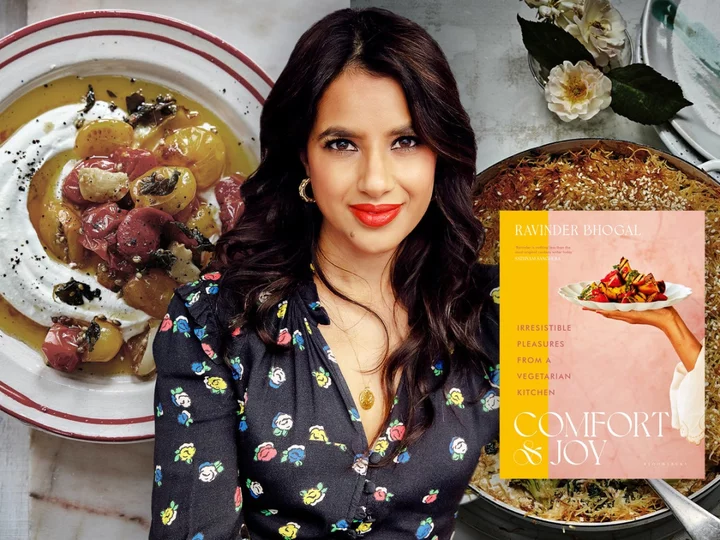
In this youth baseball league, fans who mistreat umpires are sentenced to do the job themselves
Baseball is steeped in the tradition of fans wanting to jeer the umpire
2023-06-09 12:27

10 Strategies Firefighters Use to Fight Wildfires
There are several techniques firefighters use to put fires out quickly, completely, and safely.
2023-06-09 04:25

Tens of thousands join Tel Aviv Pride parade, celebrating gains and wary of Israeli government
Tens of thousands of people have marched in Tel Aviv’s Pride parade
2023-06-09 02:26

The 8 Best Sci-Fi Movies on Netflix Right Now
From dystopian nightmares to paranormal action thrillers, Netflix has got something to scratch every type of sci-fi fan's itch.
2023-06-09 00:17

Man who had terminal cancer was told to ‘breathe into a paper bag’
A man who died of brain cancer was misdiagnosed with anxiety and told to “breathe into a paper bag”. Keith Evans was 21 when he collapsed during a suspected panic attack in February 2010. He later developed painful headaches and was given tools to manage his anxiety. Weeks later during a visit to his GP, he was referred for an MRI scan where he was diagnosed with a glioblastoma, a fast-growing and aggressive brain tumour. Despite being given six months to live, Keith survived five-and-half years. He died aged 27 in October 2015. Keith’s mum, Lorraine, from Bulkington, Warwickshire, said: “We felt like paranoid parents. “Although at the time he was interviewing for a new job, we thought this could have caused some unrest but being told he was having panic attacks seemed odd. “After multiple occasions where we called 999 we were told the same thing and Keith was given ways to manage his anxiety; including breathing into a paper bag.” Throughout his cancer battle, he raised tens of thousands of pounds for charity whilst undergoing radiotherapy and life-long chemotherapy treatment. Lorraine added: “Keith wanted to be one of the 5% of GBM patients who survive more than five years. “He made dramatic changes to his lifestyle and took up cycling as he was no longer allowed to drive. “He made a name for himself within the cycling community. A favourite event which came about inspired by his journey was called Ride on Keith. “He got to take part in the event before coming off his bike due to a seizure in 2015. Soon his mobility deteriorated, and a scan showed the tumour had returned.” This weekend, dozens of cyclists are expected to take part in the final bike ride in memory of the father-of-one from Bulkington who died of brain cancer in October 2015, raising funds for Brain Tumour Research. The final ‘Ride on Keith’ event will take place this Saturday (10 June). Since its inception the event has raised more than £7,500 for Brain Tumour Research. Amongst the riders will be Keith’s widow, Harriet Evans and their son, 10-year-old Joel, who was just one when Keith died. The 25, 55 and five-mile children’s friendly cycle ride will set off from Makins Fishery on Bazzard Road at 8:30am. Lorraine said: “For over a decade, we’ve helped to raise the profile of brain tumours and worked towards driving more funding to find a cure for the disease, with Keith at the helm of the events when he was alive. “He achieved so much in the five-and-half-years he survived including cycling 275 miles from London to Paris and covering the 1,000 mile route from Land’s End to John O’Groats over a ten-day period - all during treatment. “Since his death, the event has been a fantastic way to remember him and this year we hope to create lasting memories whilst raising money for Brain Tumour Research. “Although this is the last event of its kind, we will continue to work with the charity to raise awareness for more research into the disease.” One in three people know someone affected by a brain tumour. They kill more children and adults under the age of 40 than any other cancer, yet just 1% of the national spend on cancer research has been allocated to brain tumours since records began in 2002. Mel Tiley, community development manager at Brain Tumour Research, said: “We’re grateful to Keith’s family for sharing his story. “It’s wonderful to hear of everything Keith achieved after receiving a shocking diagnosis. “His story reminds us that brain tumours are indiscriminate, and they can affect anyone and any age. “If we are to understand the complexity of each diagnosis, we need more funding to research the disease.” Read More ‘Fearful’ Shannen Doherty shares devastating cancer update Cancer patients face worsening treatment delays due to lack of staff, finds report Origins of masturbation traced to primates 40 million years ago ‘Fearful’ Shannen Doherty shares devastating cancer update Fitness fanatic, 26, diagnosed with stage 4 cancer after feeling dizzy Do yoga to cut cancer risk, say scientists
2023-06-08 16:25

South Korean inquiry to look into 237 more foreign adoptions suspected to have laundered origins
South Korea's Truth and Reconciliation Commission will investigate 237 more cases of South Korean adoptees who suspect their family origins were manipulated to facilitate their adoptions in Europe and the United States
2023-06-08 15:30

Air India Flight Heads to San Francisco After Emergency Landing in Russia
An Air India Ltd. plane carrying passengers and crew who had been diverted to Russia due to an
2023-06-08 15:19

‘Robot taxi’ with smiling face and ‘ghost driver’ interacts with pedestrians in new experiment
The UK’s first-ever “ghost driver” has taken to the roads of Nottingham in a new experiment. A driverless car was been fitted visual displays to communicate with people crossing roads to determine how people respond naturally to self-driving vehicles. The screen shows different images to pedestrians - including a happy face, a giving way face, and a raised eyebrow. A University of Nottingham study found that, in the absence of someone in the driving seat, pedestrians trust certain visual prompts more than others when deciding whether to cross in front of an autonomous car.
2023-06-08 14:56

Mother sparks debate after ‘shaming’ parent who wouldn’t give her daughter a slice of birthday cake
A mother has sparked a debate after criticising a parent who wouldn’t give her child a piece of birthday cake. Kat Stickler shared a recent video on TikTok about her experience with a fellow mother. She confessed that she was going to “mom shame” someone, before noting that the only other people she’s “mom shamed” before were herself and her own mother. Before adding another parent to her list, she asked viewers if she was “entitled” or if what happened was “messed up”. In the video, she explained how she and her daughter noticed a group of children at a birthday party in a park. “Two hours ago, literally right now, MK and I were at the park in our neighbourhood,” she said, referring to her daughter. “And it was us and this birthday group…These kids are having their birthday party. MK’s playing with them for half an hour. They’re making friends, it was nice. It was actually very cute.” Stickler then explained that when it was time to sing happy birthday, her three-year-old joined the rest of the children at the party. “She’s one of the group right now. They’re welcoming her with open arms,” she said. “Or, so I thought.” When she noticed her daughter’s “intention of grabbing a piece of cake,” she decided to follow her child “to make sure it’s OK, as a formality.” “Honestly, I was like, obviously it’s OK. It’s cake. It’s a massive cake. There’s lots of leftover pieces,” she explained. However, Stickler said that the party host then stepped in and stopped MK from getting a slice of cake: “The mother takes the plate away from MK, and gets down to her level, says: ‘You cannot eat this cake, OK. This is not your birthday party. These are not your friends. Where’s your mother?’” She concluded her video by placing her hands over her mouth, to show her shocked reaction to the parent’s comments. As of 7 June, Stickler’s video has more than 10.1m views, with many people in the comments sympathising with MK. They also criticised the birthday host for how she spoke to the three-year-old. @katstickler No cake for me thanks, I’m full…of rage? ♬ original sound - Kat “That’s so sad,” one wrote, while another added: “My jaw dropped.” “The part that gets me is the ‘these are not your friends,’” a third wrote. “They’ve been playing for a half an hour. To kids, that’s friendship.” Other people shared how they would have handled the situation if a child they didn’t know wanted a piece of cake at a party. “I may have said, ‘Let’s check with your mom if it’s okay for you to have a piece?’ Allergies ya know. Then a new friend would have been given cake,” one wrote. Another agreed: “The only appropriate response is, ‘Run and ask your mom if you’re allowed to have cake.’ Reengages the parent and gives you a second to count the slices.” However, some people said that they wouldn’t have let their children hang out with the children at this birthday party in the first place. “This is a hard spot. I wouldn’t have let my kids walk over personally. We weren’t invited and playing together at the park isn’t a invite to a private moment,” one wrote. “But also I would never take cake from a child and say that. I would’ve asked for mom first.” “Personally I’d avoid the situation and move my kids,” another added. “I’m normally the one to encourage connections but not at a party my kid wasn’t invited to. Speaking to Today, Stickler noted that after this incident happened, she took her child to get a dessert of her own. She also said that MK was “totally fine” after hearing the parent’s remark. “People have been asking me, ‘What did you say to the mom?’ The mom was literally the least of my concerns,” Stickler explained. “I was worried about MK.” The Independent has contacted a representative for Stickler for comment. Read More Mother reveals the sweet meaning behind viral graduation gift for her daughter Daughter reveals stark contrast between her parents’ homes: ‘Complete opposites’ Mother hit with deluge of abuse for taking toddler’s packed lunch to a restaurant I tried anti-bloating pills for two weeks, and now I know the gassy truth How to protect pets from wildfire smoke amid air quality alert Gamer finds indent in head from prolonged headset use after shaving his hair
2023-06-08 14:24

How to protect pets from wildfire smoke amid air quality alert
New York City and much of the tri-state area has been blanketed by smoke caused by raging wildfires in Canada. The poor air conditions have continued to spread throughout the northeastern United States. On Wednesday (7 June), New York City was ranked number one for the worst air quality in the world, with the Air Quality Index (AQI) at 342 and air pollution levels described as “hazardous”. Many officials have since advised people to limit their time outdoors and wear masks to protect themselves from the smoke. Public schools have also cancelled outdoor activities, including recess and gym classes. Follow for live air quality alert updates. Experts estimate that each hour of exposure to wildfire smoke is equivalent to smoking cigarettes continuously for the same amount of time, but that’s just for humans. Imagine how wildfire smoke affects our beloved pets? In fact, poor air quality may pose an even greater risk to animals because of their much smaller size. Here’s how to protect your pets from wildfire smoke as air quality alerts continue throughout New York. The biggest danger to pets comes from the fine particles found in air pollutants, which can get into the lungs and cause a variety of health issues – like eye irritation or respiratory problems. Some of the most vulnerable pets are older animals suffering from heart or lung disease. Certain breeds, such as pugs and bulldogs, may be especially at risk of inhaling too much smoke, according to the American Kennel Club. There are several signs that indicate a pet may be having problems from poor air quality. According to the US Environmental Protection Agency (EPA), some of the symptoms include coughing or gagging (particularly in cats), red or watery eyes, inflammation of the throat or mouth, trouble breathing, fatigue or weakness, and reduced appetite or thirst. The first thing pet owners should do at the sign of wildfire smoke exposure is to call their veterinarian. In the meantime, saturating a cotton ball with lukewarm water and squeezing it over an animal’s eyes can help with irritation and flush them out. In order to protect pets from wildfire smoke, try to reduce their exposure as much as possible. For outdoor pets like horses or livestock, bring these animals into a room with good ventilation, such as a utility room or garage. The EPA also states that smoke is especially tough on pet birds because of the construction of their respiratory systems. Birds that are exposed to too much smoke may act lethargic or struggle to breathe, and may sit in the bottom of their cages. Keeping the indoor air clean can also help protect animals against wildfire smoke. Pet owners should keep their windows closed and their pets in a room with an air purifier. Activities such as frying foods, burning candles, or using a fireplace can also be bad for pets because it adds air pollutants to your home. If necessary, pet owners take short potty breaks with their dog or cat before returning inside. It’s probably not best to go on a long run with an animal when air quality alerts are in effect, either. Read More Air quality – live: New York hits record pollution as Canada wildfire smoke shuts airports and risks millions From masks to AC units: All the dos and don’ts to keep safe from wildfire smoke New York air pollution spikes to hazardous ratings as wildfire smoke plagues East Coast How to protect pets from wildfire smoke amid air quality alert From masks to AC units: All the dos and don’ts to keep safe from wildfire smoke I tried anti-bloating pills for two weeks, and now I know the gassy truth
2023-06-08 13:50

Chef Ravinder Bhogal: Vegetables are the secret to saving money
With food prices hiking, many of us are looking to cut the price of our weekly shops – while still eating delicious food. And the answer, Ravinder Bhogal believes, lies in vegetables. “Vegetables are the ultimate economical thing to cook,” says the chef and restaurateur, who was discovered by Gordon Ramsay after she applied for his competition to find “Britain’s new Fanny Cradock” on The F Word. “Meat has become so expensive. If you lavish the same kind of care and attention on [vegetables] as you do a steak or joint of meat, they are going to sing with flavour.” She continues: “Why can’t you take the time to marinate vegetables, inject them with flavour, baste them, add texture to them or play with their textures?” Bhogal, who was born in Kenya to Indian parents and moved to England at the age of seven, says root vegetables are our real saviour when it comes to budget cooking in Britain. “Anything that’s grown in this country, swedes, celeriac… And if you buy in season it’s naturally going to be a bit cheaper.” The 44-year-old, who owns London restaurant Jikoni (the Swahili word for “kitchen”) is vegetarian “80 per cent of the time – then I might have a Sunday roast or something” has released her third cookbook, Comfort & Joy: Irresistible Pleasures From A Vegetarian Kitchen. “There are so many things that you can do with vegetables where you’re just not going to miss the meat. What isn’t there to love about the lightness and brightness of vegetables?” And there’s a real misconception that vegetables can’t be comforting, she says: “For me comfort is about food that nourishes you, that makes you feel well, that makes you feel alive, that makes you feel revived.” It was Bhogal’s early years in a multigenerational household in Nairobi (“My grandparents, my uncle and aunt, their children, my mother’s brood of five, whoever happened to be visiting, there was a parrot, a dog, kittens, chickens, goats – it was a really chaotic household!”) that would pave the way for how she approached food later as a chef. Her grandfather dutifully tended to his shamba – or allotment – and had a deep respect and connection to the verdant soil where many vegetables grew. “When he came from India to Kenya, he completely fell in love with this beautiful red, volcanic soil that just seemed to give and give and give,” says Bhogal. “And he never stop being grateful for that. He’d come from a place where there was so little, and then suddenly, there was this soil that just blessed him and his family with all these beautiful things to eat.” Everything the household ate was either grown by him or came from the “mama mbogas” – local women with smallholdings who peddled their “the freshest hand grown vegetables” from door to door, she says. The chef in the house was her mother though, who was an “exceptionally talented” cook. “There were so many mouths to feed, so you can imagine the level of organisation that it took. She was the commander in chief and we were all her assistants, whether you liked it or not.” As a result, Bhogal learned to cook from her mother’s direction, although she wasn’t always happy about it. “Initially, I really resented it because growing up in quite a patriarchal household, the boys would be outside playing, and the girls would be in the kitchen. And that really sucked to me. “Anything I tried to attempt to cook, [my grandfather] would always tell me how delicious it was and praise me, and I think I made that connection between food and love and winning people over with food.” And the influence of her time in Kenya can be seen in the latest book; think pili pili cassava (one of the go-to carbs in many African nations) or Kenyan maru potato bhajias with tamarind and tomato chutney (potato coated in spiced chickpea flour and fried). Swapping Kenya for England as a child left a mark on Bhogal. “Kenya is like a state of mind, it’s such a bewitching country, it never really leaves you, it clings to you,” she says. “When you grow up with such colour and such a colossal sky… I was outdoors a lot, playing with all the animals [with] this really beautiful, very lush sunny backdrop. When you are plucked from that age seven and turn up in a very grey dark England, you try and hold onto that and keep connected to that.” South East London was “very different and sort of haggard in comparison to Kenya”, she says. “Everything was very small suddenly. I grew up in a flat above a shop and going from huge trees and sky that was ever blue to turning up to this very dark, dank [place]… The adjustment was very, very difficult.” But it’s all culminated in her cookery style now. “I consider myself a hybrid, I’m Indian, there’s Persian ancestry too, I’m British, I grew up in London, I’m also the product of all kinds of the diverse immigrant communities that helped bring me up.” So you’ll find Persian-inspired fermented rice, lentil, beetroot and coconut handvo (a savoury cake) in her new book, alongside Mumbai street food like peanut and golden raisin poha, and English grilled peaches with silken tofu and Thai basil and lime leaf gremolata. The recipe for pea kofta scotch eggs with saffron yoghurt is vibrant amalgamation; honouring memories of her father bringing home a sack of locally grown peas from Nairobi’s bustling city market and shelling them in the kitchen with her mother – it is a hybrid of her mother’s Indian recipe and her British identity. Plus, some that have been tried and tested by her discerning restaurant diners, like mango and golden coin [curry with dumplings] – where the mangos are served whole, stone and all. “I remember telling my husband I was going to put this mango curry on the menu and he was like, ‘You’re insane, how are people going to eat a whole mango?’ And it’s gone on to be one of the most popular things. “I think the whole joy of a mango is the generosity of serving it whole, there’s something about a whole mango that’s so rapturous,” Boghal says. “When it comes to the table people often go, ‘Is it chicken breasts?’ Nothing gives me more joy than to see people using pooris to scrape off the flesh from the mango and pick up the stone and gnaw on it. “I think if you don’t have a problem picking up a lamb bone and gnawing it, why not a mango stone?” ‘Comfort & Joy: Irresistible Pleasures From A Vegetarian Kitchen’ by Ravinder Bhogal (Bloomsbury, £26). Read More Showstopping BBQ main dishes for a hot grill summer 7 TikTok food hacks that actually work Saltie Girl in Mayfair will make you happy as a clam – as long as you can afford it These recipes will keep you hydrated on hot days Three tomato salad recipes that aren’t boring Try one of these pasta recipes this British Tomato Fortnight
2023-06-08 13:46

I tried anti-bloating pills for two weeks, and now I know the gassy truth
Our bellies have always been the target of derision and ire. Long have they been poked and prodded. Sighed at and sucked in. Reprimanded and insulted. But ever since social media became the new WebMD for chronic self-diagnosers, it’s been open season on every little bodily function. Every involuntary twitch, skin bump and mood shift has been analysed to death – but none more so than the dreaded bloat. Stomach bloating can happen for all sorts of reasons. Often the main culprit is a big meal. It’s that feeling of being uncomfortably full and needing to undo the top button of your jeans, as if you’ve just had a particularly heavy Sunday roast. Unless you have real food intolerances or irritable bowel syndrome (IBS), or the symptom is caused by hormonal changes, bloating is the body’s normal reaction to eating a little too much. It usually subsides after a few hours. But this is 2023. A bit of bloating is no longer something you can just wait a few hours to get rid of – social media dictates that it needs to be gone immediately, and if it doesn’t then there must be something wrong with you. And not to stop there, either. You should also be cutting 10 different types of foods out of your life, doing five simple exercises 200 times a day and taking an assortment of supplements and pills because God forbid your stomach be round for the next two hours. According to Dr Tamara Alireza, a functional medicine specialist at Skinfluencer London, bloating should be taken seriously if it doesn’t come and go with food. If it becomes a chronic problem, or is accompanied by other symptoms such as persistent stomach and pelvic pain, changes to bowel habits, unexpected weight loss, fatigue and fever, vomiting, or bleeding, it may be something different entirely. “Excess bloating can be linked to IBS, inflammatory bowel disease (IBD), and coeliac disease, but also to more serious conditions,” she says. But we are a society obsessed with quick fixes, and anti-bloating pills have become a popular “cure” for the woes of a distended belly. Last month, fitness influencer Sam Cutler took it to new heights when she provided the pills for her wedding guests during the meal. Some viewers of her TikTok video – which sparked so much horror that it rapidly went viral – claimed that the pills were essentially “laxatives”. The glut of brands that have emerged in recent years would disagree, though. Many claim to use all-natural ingredients to “speed up digestion” and reduce gas without a laxative effect. Admittedly, curiosity got the better of me. I am lucky enough not to suffer from any particularly gut-churning conditions, but I do have eyes bigger than my stomach. It means I regularly end up regretting wearing trousers to a meal, cursing myself as my belly strains against the waistband. Could these pills really make me feel more comfortable after a big dinner, or would they just lead to some unfortunate toilet habits? I am kindly sent a couple of packs by Wild Dose, which lists extracts of ginger, liquorice, fennel seed, turmeric, peppermint leaf and dandelion root alongside a “proprietary enzyme complex” and a probiotic blend in each brown pill. They smell very herbal and are a rather unappealing greenish-brown colour – it initially makes me wonder if it’s an omen for what my guts are about to experience. After two weeks of taking them daily, I found that they did make a slight difference in my post-meal stupor and I feel comfortable quicker than before. However, the change has been marginal and, if anything, they made me more gassy, to the chagrin of my significant other. The medical community is reluctant to support the efficacy of similar supplements, as there remains little clinical research to back up their claims. Dr Alireza describes anti-bloat pills as a “Band-Aid on a fire hydrant” for people who have genuine problems with their gut. “I generally would not recommend taking any pills to counteract the bloating,” she says, “rather I would be keen to first determine the source of the issue.” She points to her practice, which aims to determine the root cause of symptoms and treat it – instead of providing temporary fixes. But I think the real reason behind social media’s obsession with bloating has nothing to do with #guthealth. Instead, it is our inherent fatphobia and fear of fatness that fuel this battle against the bloat. Are we so afraid of looking fat for even a couple of hours that we flock to pills and exercises with such abandon? Given the way people have fallen over themselves to get their hands on Ozempic, a drug intended to help diabetes patients but which has made a name for itself as a weight-loss miracle, it appears the answer is yes. It’s no mistake, either, that women are the primary targets for anti-bloating content online. Studies show that women are twice as likely to experience it as men, particularly during menstruation and menopause because of hormonal fluctuations. But the expectation for women to maintain at least the illusion of thinness at all times is also much higher. Many of us learned at an early age how to suck in our stomachs and – even as adults – keep them sucked in pretty much all day. As I write this, I realise that I’ve been subconsciously engaging my core muscles despite sitting behind a desk. No wonder the promise of no more bloating is so appealing, if it makes looking mildly smaller less of a chore. Joanna Dase, fitness expert and operations director of female-focused health clubs Curves, says that any medical conditions should be diagnosed by qualified professionals rather than social media. She acknowledges that while bloating can affect body image, no one should worry about your normal, natural responses to digestion. “If you have a professional opinion and there is no health problem related to it, then you just need to have an actual understanding of your body and its natural functions, and being OK with yourself. It’s just how your body breaks down food.” Read More Wellness gurus claim your hormones are out to get you – but is it just another scam? ‘Thanks Pfizer’: The weird world of shakes, health anxiety and illness online A One Direction fan claimed she had a brain tumour. Five years after her death, we still need answers How to protect pets from wildfire smoke amid air quality alert Gamer finds indent in head from prolonged headset use after shaving his hair From masks to AC units: All the dos and don’ts to keep safe from wildfire smoke
2023-06-08 13:45
